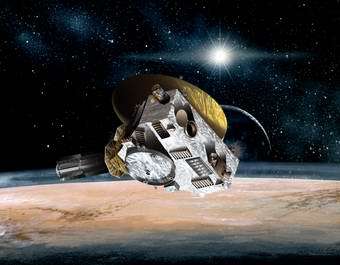NASA Pluto probe launch postponed (Update 2)

NASA postponed Tuesday the launch of the world's first probe to the icy, never-explored planet of Pluto after excessively strong winds put the liftoff at risk.
Engineers at the US space agency struggled with gusty winds throughout the two-hour launch window at Cape Canaveral, Florida before they finally aborted Tuesday's planned liftoff for the massive Atlas V rocket.
They scheduled a new launch for Wednesday, setting a two hour window from 1:16 pm (1816 GMT) for the ambitious mission to the outer reaches of the solar system.
"The ground winds exceeded our limits," said a spokesman for the National Aeronautics and Space Administration (NASA). "The ground winds were a little too stiff for us."
The New Horizons mission endeavors to propel a grand-piano-sized spacecraft, packed with scientific instruments to Pluto, the outermost of the nine official planets of the solar system.
Flying at unparalleled speeds of up to 75,000 kilometers (47,000 miles) per hour, it will take the craft ten years to reach Pluto.
The craft will explore Pluto and its large moon Charon and, continuing on a trajectory away from the sun, will then spend five more years probing the icy and rocky bodies of the Kuiper Belt.
Scientists hope the ambitious journey will deliver new views and insights into our solar system, allowing them to better understand the origins of Earth and the other planets some 4.5 billion years ago.
"What we know about Pluto today could fit on the back of a postage stamp," said Colleen Hartman, NASA deputy associate administrator.
"The textbooks will be rewritten after this mission is completed."
The mission's chief scientist, Alan Stern, of the Southwest Research Institute's Department of Space Studies, compared the opportunity to a great "archaeological dig" into the oldest strata of the solar system.
NASA is attempting to take advantage of a timely alignment that puts Pluto, which has a uniquely inclined and non-circular, 248-year orbit of the sun, in a position that would allow the space agency to tap into the gravitational force of Jupiter to sling the spacecraft outward at accelerated speeds.
That will help cut about 30 months off the trip to Pluto, which the craft will approach between July 2015 and July 2017. During that period, it should brush as close as 10,000 kilometers (6,200 miles) to the planet.
Pluto, whose traditional identity as the ninth planet of the solar system is now debated, will be examined for the composition of its atmosphere, its geology and its interaction with solar winds.
A dust monitor on the New Horizons craft will analyze interstellar particles, and a radio experiment will test other characteristics of the planet.
Travelling at the speed of light, it will take radio transmissions of data from the spacecraft about four hours and 25 minutes to reach the Earth in 2015.
Scientists hope Pluto and Charon, and the millions of pieces of astral debris in the Kuiper belt beyond, will reveal some of the secrets of the formation of the universe.
© 2006 AFP


















